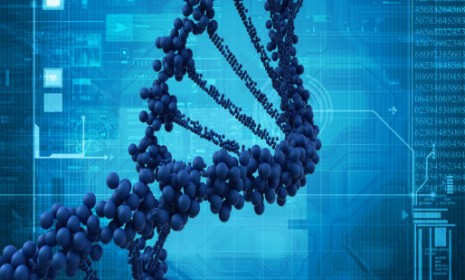The secret purpose of 'junk DNA': A guide
Scientists discover that a mysterious swath of our genome contains millions of switches that can mean the difference between John Doe and Usain Bolt

A free daily email with the biggest news stories of the day – and the best features from TheWeek.com
You are now subscribed
Your newsletter sign-up was successful
So-called "junk DNA" — which doesn't actually code for proteins — has long been considered the "dark matter" of human biology because we understand so little about it. And junk DNA is quite prevalent, as scientists have long believed that only 1 percent of our genome actually codes for the building blocks of life. The exact role of the rest of our DNA has been a mystery. But now, a major breakthrough from the five-year Encyclopedia of DNA Elements (ENCODE) project reveals that junk DNA plays a more critical part in our biology than we ever realized. Indeed, junk DNA could unlock cures for diseases like cancer and Alzheimer's, and maybe even allow us to bio-engineer Olympic-caliber athletes. Here's what you should know:
What exactly did scientists discover?
We used to believe that nearly 99 percent of our DNA was junk, a bit like "all the deleted fragments of documents that clog up your hard disk," says Johnjoe McFadden at Britain's Guardian. But the ENCODE consortium, comprised of 442 researchers working in 32 institutes around the world, found that the material is actually "packed full of genetic switches that tell each cell in your body which genes must be switched on or off to make a muscle, skin, or nerve cell." Researchers found over four million of these gene switches hidden in the not-really-junk DNA — 80 percent of which have "specific biochemical functions," says George Dvorsky at io9.
The Week
Escape your echo chamber. Get the facts behind the news, plus analysis from multiple perspectives.

Sign up for The Week's Free Newsletters
From our morning news briefing to a weekly Good News Newsletter, get the best of The Week delivered directly to your inbox.
From our morning news briefing to a weekly Good News Newsletter, get the best of The Week delivered directly to your inbox.
What functions do junk DNA perform?
Because they give instructions on how to create a variety of cells, gene switches in junk DNA can impact height, hair growth, and even musculature. These gene switches are also linked to "a range of human diseases," says Gina Kolata at The New York Times, including multiple sclerosis, lupus, rheumatoid arthritis, Crohn's disease, and celiac disease. In short: Gene switching could mean the difference between healthy people and sick people, says the Guardian's McFadden. It could also mean the difference between a Regular Joe and Superman — "between us and Usain Bolt, for example."
Can we control gene switches to create superhumans?
Maybe one day... but it won't be easy. Some act less like a switch and more like a "volume knob, turning a gene up or down depending on the specific function," says io9's Dovorsky. Think of it more like a "vastly complicated gene circuit board," says the Guardian's McFadden. "Flipping one switch will be more like dropping a stone into a pool: The effects will reverberate through the entire network, and the eventual outcome will not be easy to predict."
A free daily email with the biggest news stories of the day – and the best features from TheWeek.com
How big of a breakthrough is this?
It's "very significant," Dr. Mark A. Rubin, a prostate cancer genomics researcher who wasn't involved with the project, tells the Times. The findings "will definitely have an impact on our medical research on cancer." For instance, in the future, rather than trying to attack a tumor cell directly, flipping a gene switch that made a cell cancerous in the first place could become an effective form of treatment.
Sources: Guardian, io9, New York Times, Popular Science